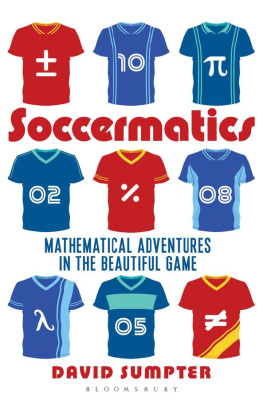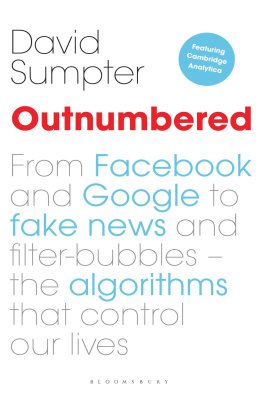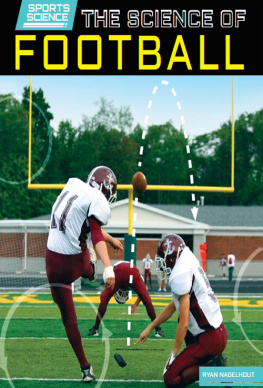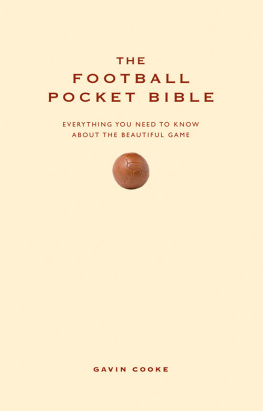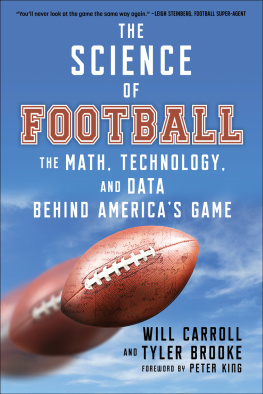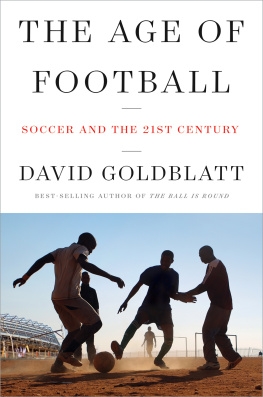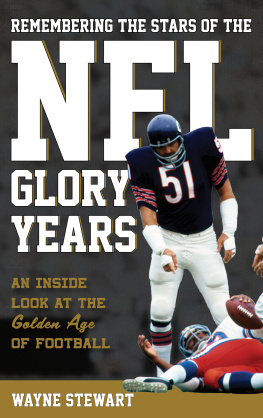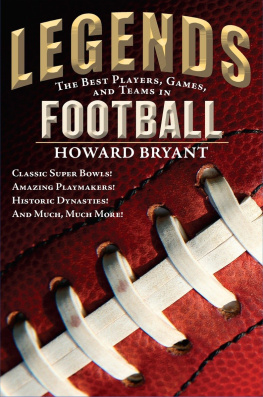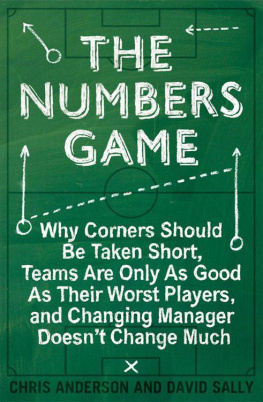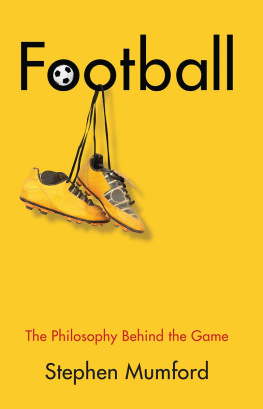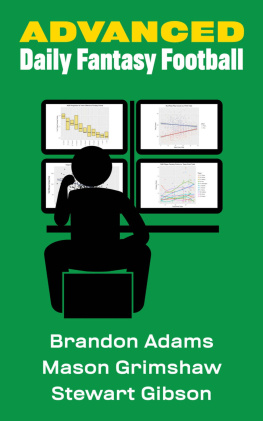A NOTE ON THE AUTHOR
David Sumpter is Professor of Applied Mathematics at the University of Uppsala, Sweden. Born in London but raised in Scotland, he completed his doctorate in Mathematics at Manchester, and was a Royal Society Research Fellow in Oxford before heading to Sweden.
Davids research has shown how mathematics can be applied to anything and everything, and in particular to social behaviour. An incomplete list of his research projects includes: pigeons flying in pairs over Oxford; clapping undergraduate students in the north of England; swarms of locusts traveling across the Sahara; disease spread in remote Ugandan villages; the gaze of London commuters; and the tubular structures built by Japanese amoebae.
In his spare time, he exploits his mathematical expertise in training a successful under-tens football team, Uppsala IF P05. David is a Liverpool supporter with a lifelong affection for Dunfermline Athletic.
SOCCERMATICS
MATHEMATICAL ADVENTURES
IN THE BEAUTIFUL GAME
PRO-EDITION
David Sumpter

Contents
Mathematics cant compete with football. Football captures the hopes and dreams of nations. It brings us together in admiration of ability and commitment. It has superstars and tactics, entertainment and excitement. Football covers the back pages of newspapers and fills our Twitter feed. Tens of thousands of fans cram into grounds, and billions of people watch the World Cup on TV. Compare this with mathematics. Obscure academic journals lie unread in empty libraries. Seminars are attended by two gently snoring professors and a small group of bored PhD students. Football and mathematics? There is no competition.
If mathematics could compete with football, then we would be ready to pay 40 a month for a subscription to Sky Mathematics. Instead of spending Wednesday evening in front of the Champions League, we would load up Khan Academy and brush up on linear inequalities. If mathematics could compete with football, we would spend our November afternoons sitting on freezing plastic seats watching Marcus du Sautoy blackboard out that cocky Manc physicist from the TV. Arsenal one, Oldham Athletic nil. Instead of saying, Its a game of two halves, wed say, Its a single division of the unit interval into sets of equal measure. Instead of He gave 110%, the commentator would say... well, hed say, He gave 100%.
It is not as if mathematics wasnt given its chance. We all sat in school learning our times tables and tapping numbers into calculators. All those hours spent trying to remember whether 7 times 8 is 56 or 54, or whether the pi are squared or circled. Given all that time, and all that training, you would think that people would have noticed if mathematics was as exciting as football. But it seems that most people cant be so easily fooled. There may well be quite a few people who enjoy maths, but there are many, many more who totally love football.
I am one of those people who enjoy maths almost as much as I enjoy football. I am a mathematics professor, and I spend my day creating and understanding mathematical models. But even I wouldnt go as far as to claim that maths can compete with football. It cant. The numbers are against it.
Sometimes, when I look up at football and then back down at my maths books, I start to wonder what exactly I am doing with my life. Here I am, a professor of applied mathematics. I work on a wide range of different and interesting problems, with researchers from around the world. I have the opportunity to travel widely, to present my work at conferences in exotic locations, and to visit world-leading universities. All of this should be like playing for England. But it isnt, and I know it isnt. Being a mathematician is respectable, but it is nothing like succeeding in football.
The great footballers not only master technique and skill, they also achieve incredible levels of physical fitness. Footballers certainly arent thick. On the contrary, the first thing football scouts look for in youngsters is intelligence, the ability to see quickly what is going on around them and to plan for all eventualities something we academics might call spatial reasoning. Nor are footballers lazy. They are highly motivated, focused, driven individuals who decide from an early age that they want to succeed. Footballers are worshipped because they really have achieved greatness. The rest of us can only dream.
Im the type of person who cant stop myself from dreaming. Despite now being 42 years old, and with two left feet and only a moderate interest in working out, I cant stop myself from believing that I can contribute to football. After all, planning and reasoning were also on that list of prerequisites for footballing success, werent they? These are things I am good at. Maybe maths has something to offer football? And just maybe, football has something to offer maths?
There are good reasons to believe that my hard-earned modelling skills may prove useful after all. Numbers play an increasingly important role in football. Player and team rankings, assists and goals, possession and passing rate, tackle and interception frequency are just a few of the stats that feature in match reports. Detailed chalkboards of corner angles, passing timelines and positional heat maps are displayed on managers computer screens in post-match briefings. But these numbers are just a starting point. Mathematics is about putting statistics together in a way that allows us to see what is going on. Once we have numbers, mathematics gives us understanding.
There is a whole range of footballing questions that can be answered using mathematics. What is the probability of two last-minute goals in a Champions League final? Whatever Manchester United fans may say, this is a question about the nature of pure randomness. Why is Barcelonas tiki-taka passing so effective? This is a question of geometry and dynamics. Why do we give three points for a win in league games? This is a question of game theory and incentives. Who is best, Messi or Ronaldo? This is a question of large statistical deviations. What do heat maps and passing statistics actually tell us about a game? This is a question for big data and networked systems. How can bookies offer such attractive-looking spread bets? This is a question of combining probability and psychology. And why are these odds so hard to beat? This is a question of collective intelligence and averaging.
I will answer all these questions and more in this book, but my ambition stretches further. Soccermatics isnt simply about providing you with a few maths-related football facts that you can tell your friends down the pub; its about changing the way you look at both maths and football. I believe that the two have a lot to offer each other and, while maths cant compete with football, both subjects can learn from each other. Maths can be used to understand football, and football helps to explain mathematics.
Football and maths start from the same point. Football starts with the laws of the game, the rules set out by the International Football Association Board. What football managers have to do is solve the problem of getting their team to win within the constraints imposed by these rules. Mathematics has its own set of rules, which the mathematician has to apply to get the right answer to the question posed. By following these rules, and with a little bit of inspiration, both the footballer and the mathematician seek to reach their goal. Management and mathematics both start with theory.
But the rules of the game arent everything. Its one thing for the manager to explain the importance of the players holding their positions, but if a central defender picks up the ball in their own half, charges with confidence towards the opponents goal and bangs it into the top-left corner, then not even Louis van Gaal will complain. Most of us are happy to accept that what happens in practice can be very different from what the theory says should happen. If everyone stuck to the theory, then football matches and life in general would be very boring indeed.
Next page
